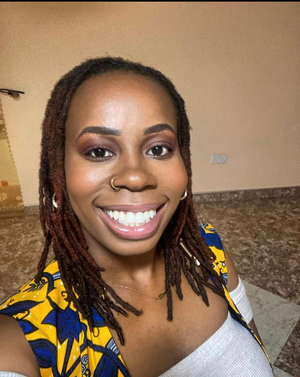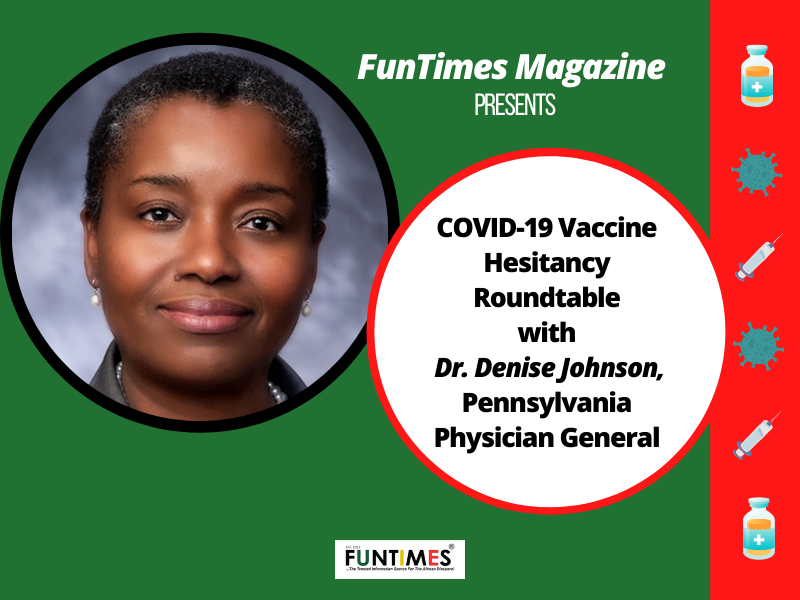On Thursday, October 28th at 2:00 pm EST, FunTimes Magazine partnered with the Pennsylvania Department of Health and various media stakeholders to host a COVID Vaccine Hesitancy Roundtable, led by Dr. Denise A. Johnson.
During this event, which was hosted by Sandra Lawrence, the Associate Publisher of FunTimes Magazine, Dr. Denise Johnson, and representatives from the Philadelphia Tribune, Chester News, the Scoop, the Philadelphia Sunday Sun, and FunTimes Magazine discussed important questions around COVID-19 vaccine hesitancy.
Dr. Denise A. Johnson is the acting Physician General of the Pennsylvania Department of Health. She is board certified in obstetrics and gynecology and has been practicing medicine for 13 years. In addition to being board certified,, Dr. Johnson is the past Chair of the Board of Directors on the Pennsylvania Coalition Against Rape and has served as Chief Medical Officer of Meadville Medical Center. She focuses on diversity and inclusion and the needs of women.
Dr. Johnson says that as part of Governor Tom Wolf’s COVID vaccination campaign, the PA Department of Health is collaborating with organizations to reach out to communities with low vaccination rates to address hesitancy from Erie, Pittsburgh, State College, and more, to create equity. “These vaccines are new to us so it is okay for people to have questions about them. We know that good information will help people to make good decisions like getting vaccinated.”, she says.
Loretta Rodgers from Chester News asked: “What can media outlets do to create awareness?
Dr. Johnson said people can make impacts on an individual level, and answered: “People who are not vaccinated should talk with other people who are vaccinated. The vaccines are working as designed. The vaccines even help with the Delta variant.”
Ayana Jones from the Philadelphia Tribune asked: “Can you speak to the state’s response to children getting vaccinated and what parents should know?”
Dr. Johnson answered: “We are excited for the possibility of vaccination for 5 to 11-year-olds. The federal government has allowed us to preorder vaccinations for the group pending approval. We have been working with pediatricians and other stakeholders. We expect vaccinations at pediatrician offices, primary care offices, children’s hospitals, children’s schools, and more.”
Thera Martin, Columnist/Journalist at The Scoop and Writer for the Philadelphia Sunday Sun asked: “What can you say to people about mixing booster shots?”
Dr. Johnson answered: “Booster shots have been recommended for certain populations who are eligible or with autoimmune diseases, but not for everyone across the board. Certain populations may have weaning of immunity over time, like people over 65 or with an underlying medical condition. It can also depend on one’s environment or place of work. It is recommended to take the same one you had before. Research has shown that people with the initial Johnson & Johnson that take boosters with MRNA vaccines have higher immunity. If you take an MRNA one you may have a higher immunity, but all of them give coverage so you shouldn’t be concerned.”
Catherine Hicks from the Philadelphia Sunday Sun asked: “Should a person still get a booster shot if they have already contracted COVID and have received their vaccine?”
Dr. Johnson answered: “It’s still recommended to get a booster. There is not good data to determine how much natural immunity one may have. She also notes that booster shots are for people who are eligible and with autoimmune diseases. If you take Pfizer or Moderna, it is 6 months after the dose. With Johnson & Johnson, the booster is 2 months.”
Caren Warrington from FunTimes Magazine asked: “What has the health department learned about and done to address the COVID-related racial disparity?
Dr. Johnson says: “People who have been historically underserved suffer more during a pandemic. We have seen that Black and brown people suffered more with contracting, hospitalization, and health due to lack of access to healthcare and more. When we see areas that are under-vaccinated we do outreach for people to catch up. Over time, we partnered with local grassroots organizations to do pop up clinics in areas or make sure hospitals have enough vaccinations, or mobile clinics. We also partnered with Hispanic communities and doctors who they can relate to that speak Spanish.”
Learn more about COVID-19 and the vaccine at pa.gov/covid.
Stay tuned for part II of this event recap.
This article has been made possible by the Independence Public Media Foundation.


Nana Ama Addo is a writer, multimedia strategist, film director, and storytelling artist. She graduated with a BA in Africana Studies from the College of Wooster, and has studied at the University of Ghana and Kwame Nkrumah University of Science and Technology. Nana Ama tells stories of entrepreneurship and Ghana repatriation at her brand, Asiedua’s Imprint ( www.asieduasimprint.com ).





